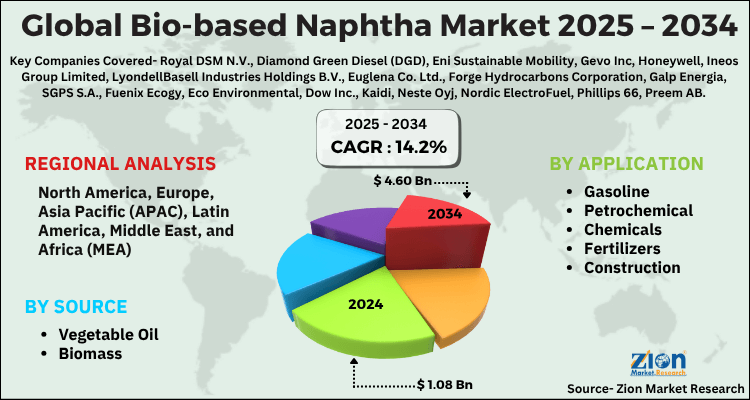Global Bio-based Naphtha Market Size, Share, Growth Analysis Report - Forecast 2034

Bio-based Naphtha Market By Source (Vegetable Oil, Biomass), By Application (Gasoline, Petrochemical, Chemicals, Fertilizers, Construction, Others), and By Region: Global and Regional Industry Overview, Market Intelligence, Comprehensive Analysis, Historical Data, and Forecasts 2025 - 2034
| Market Size in 2024 | Market Forecast in 2034 | CAGR (in %) | Base Year |
|---|---|---|---|
| USD 1.08 Billion | USD 4.60 Billion | 14.2% | 2024 |
Bio-based Naphtha Market: Industry Perspective
The global bio-based naphtha market size was worth around USD 1.08 Billion in 2024 and is predicted to grow to around USD 4.60 Billion by 2034 with a compound annual growth rate (CAGR) of roughly 14.2% between 2025 and 2034. The report analyzes the global bio-based naphtha market's drivers, restraints/challenges, and the effect they have on the demands during the projection period. In addition, the report explores emerging opportunities in the bio-based naphtha industry.
Bio-based Naphtha Market: Overview
A by-product of the manufacturing of Hydrotreated Vegetable Oil (HVO), also known as renewable diesel and Sustainable Aviation Fuel (SAF), is bio-based naphtha (bio-naphtha). Gasification can also be used to create it as a stand-alone product. When mixing gasoline or making sustainable plastic, bio-naphtha can be utilized as a direct replacement for fossil-based naphtha. For HVO and SAF, producers employ a broad range of feedstocks, including residual cooking oil, vegetable oils like palm & rapeseed, waste by-products from industries like the manufacture of wood pulp (sometimes referred to as crude tall oil, or CTO), and animal fats.
Key Insights
- As per the analysis shared by our research analyst, the global bio-based naphtha market is estimated to grow annually at a CAGR of around 14.2% over the forecast period (2025-2034).
- Regarding revenue, the global bio-based naphtha market size was valued at around USD 1.08 Billion in 2024 and is projected to reach USD 4.60 Billion by 2034.
- The bio-based naphtha market is projected to grow at a significant rate due to increasing demand for sustainable and renewable energy sources, stringent environmental regulations aimed at reducing carbon emissions, and the growing adoption of bio-based chemicals and plastics across various industries.
- Based on Source, the Vegetable Oil segment is expected to lead the global market.
- On the basis of Application, the Gasoline segment is growing at a high rate and will continue to dominate the global market.
- Based on region, North America is predicted to dominate the global market during the forecast period.
Bio-based Naphtha Market: Growth Drivers
Key Growth Drivers:
The bio-based naphtha market is driven by increasing demand for sustainable and eco-friendly chemical feedstocks as industries seek alternatives to fossil-based products. Growing environmental concerns and stringent regulations on carbon emissions encourage the shift toward bio-based solutions. The rising adoption of bio-based naphtha in the production of biofuels, plastics, and chemicals enhances its market growth. Additionally, advancements in bio-refining technologies and the availability of renewable feedstocks such as biomass and agricultural waste support cost-effective production, boosting market expansion globally.
Restraints:
High production costs associated with bio-based naphtha remain a major restraint for the market, limiting its widespread adoption compared to traditional naphtha derived from crude oil. Limited availability and seasonal dependency of raw materials like biomass can affect production consistency and supply stability. The requirement for significant infrastructure investment in bio-refineries further restricts rapid expansion, especially in developing regions. Additionally, technological challenges in scaling up bio-based naphtha production to meet industrial demands pose a hurdle for market growth.
Opportunities:
The increasing emphasis on reducing greenhouse gas emissions and transitioning to a circular economy presents significant opportunities for the bio-based naphtha market. Expanding investments in bio-refinery projects and government incentives for sustainable fuel production can drive adoption. Rising demand for bio-based naphtha in developing regions, driven by industrial growth and environmental policies, creates new market avenues. Innovations in feedstock processing and bio-conversion techniques can further improve production efficiency and cost-effectiveness, opening doors for greater penetration in chemical manufacturing and renewable fuel markets.
Challenges:
One of the main challenges in the bio-based naphtha market is competition from cheaper fossil-based alternatives, which limits cost competitiveness. Variability in biomass supply due to climatic conditions or agricultural yield fluctuations can disrupt production. The lack of standardized global policies for bio-based product certification and sustainability creates uncertainty for market players. Additionally, scaling production while ensuring environmental sustainability and economic viability requires significant technological advancements, making it a critical challenge for the industry.
Bio-based Naphtha Market: Segmentation
The global Bio-based Naphtha industry is segmented based on source, application, and region. All the segments have been analyzed based on present and future trends and the market is estimated from 2025 to 2034.
Based on the source, the global market is bifurcated into vegetable oil and biomass. The vegetable oil segment is expected to dominate the bio-based naphtha industry over the forecast period. Vegetable oils are a common feedstock for bio-based naphtha production due to their widespread availability and potential for sustainable sourcing. Various vegetable oils, such as soybean oil, palm oil, canola oil, sunflower oil, and others, are used as feedstocks for bio-based naphtha production. Different oils have varying compositions and characteristics that can influence the efficiency of conversion processes. Thus, this is expected to drive the segment growth over the forecast period.
Based on the application, the bio-based naphtha industry is bifurcated into gasoline, petrochemicals, chemicals, fertilizers, and others. The fertilizers segment is expected to hold the largest market share over the projected period owing to the efforts of many countries to use bio-based products in agricultural lands.
The Regional, this segment includes the current and forecast demand for North America, Europe, Asia Pacific, Latin America,and the Middle East and Africa.
Bio-based Naphtha Market: Report Scope
| Report Attributes | Report Details |
|---|---|
| Report Name | Bio-based Naphtha Market |
| Market Size in 2024 | USD 1.08 Billion |
| Market Forecast in 2034 | USD 4.60 Billion |
| Growth Rate | CAGR of 14.2% |
| Number of Pages | 230 |
| Key Companies Covered | Royal DSM N.V., Diamond Green Diesel (DGD), Eni Sustainable Mobility, Gevo Inc, Honeywell, Ineos Group Limited, LyondellBasell Industries Holdings B.V., Euglena Co. Ltd., Forge Hydrocarbons Corporation, Galp Energia, SGPS S.A., Fuenix Ecogy, Eco Environmental, Dow Inc., Kaidi, Neste Oyj, Nordic ElectroFuel, Phillips 66, Preem AB, Repsol S.A., Resynergi Inc, SABIC, Shell, St1 Oy, TotalEnergies Corbion, UPM Biofuels, Versalis SpA, and others. |
| Segments Covered | By Source, By Application, and By Region |
| Regions Covered | North America, Europe, Asia Pacific (APAC), Latin America, The Middle East and Africa (MEA) |
| Base Year | 2024 |
| Historical Year | 2020 to 2023 |
| Forecast Year | 2025 - 2034 |
| Customization Scope | Avail customized purchase options to meet your exact research needs. Request For Customization |
Bio-Based Naphtha Market: Regional Analysis
Europe is expected to dominate the market during the forecast period
Europe is expected to dominate the global bio-based naphtha market over the forecast period. The market growth in the region is owing to the increasing circular economy initiatives. The concept of a circular economy, where resources are reused, recycled, and repurposed, is gaining traction. Bio-based naphtha fits into this model by utilizing waste and biomass feedstocks, reducing waste, and promoting the sustainable use of resources. For instance, according to secondary sources, cities in Europe play a significant role in fulfilling the European waste management goals, especially when it comes to separate collection, resource recovery, and ultimate disposal.
European cities have vast expertise in offering sustainable waste management as a service of popular interest. Cities are in a good position to promote sustainable consumption locally and include all sectors because 90% of the garbage they now produce may be recycled or repurposed. Cities absorb more than 75% of the world's natural resources, generate more than 50% of its trash, and create 60-80% of its greenhouse gas emissions. By 2030, the circular economy in Europe has the potential to boost GDP by an extra 0.5%, add 700,000 employment, and reduce GHG emissions and our environmental impact. Therefore, the growing circular economy initiatives in the region will drive market growth.
Bio-based Naphtha Market: Competitive Analysis
The report provides a company market share analysis to give a broader overview of the key market players. In addition, the report also covers key strategic developments of the market, including acquisitions & mergers, new product launches, agreements, partnerships, collaborations & joint ventures, research & development, and regional expansion of major participants involved in the bio-based naphtha market on a global and regional basis.
The global Bio-based Naphtha market is dominated by players like:
- Royal DSM N.V.
- Diamond Green Diesel (DGD)
- Eni Sustainable Mobility
- Gevo Inc
- Honeywell
- Ineos Group Limited
- LyondellBasell Industries Holdings B.V.
- Euglena Co. Ltd.
- Forge Hydrocarbons Corporation
- Galp Energia
- SGPS S.A.
- Fuenix Ecogy
- Eco Environmental
- Dow Inc.
- Kaidi
- Neste Oyj
- Nordic ElectroFuel
- Phillips 66
- Preem AB
- Repsol S.A.
- Resynergi Inc
- SABIC
- Shell
- St1 Oy
- TotalEnergies Corbion
- UPM Biofuels
- Versalis SpA
The global Bio-based Naphtha market is segmented as follows:
By Source
- Vegetable Oil
- Biomass
By Application
- Gasoline
- Petrochemical
- Chemicals
- Fertilizers
- Construction
- Others
By Region
- North America
- The U.S.
- Canada
- Europe
- France
- The UK
- Spain
- Germany
- Italy
- Rest of Europe
- Asia Pacific
- China
- Japan
- India
- South Korea
- Southeast Asia
- Rest of Asia Pacific
- Latin America
- Brazil
- Mexico
- Rest of Latin America
- Middle East & Africa
- GCC
- South Africa
- Rest of Middle East & Africa
Table Of Content
Methodology
FrequentlyAsked Questions
A by-product of the manufacturing of Hydrotreated Vegetable Oil (HVO), also known as renewable diesel and Sustainable Aviation Fuel (SAF), is bio-based naphtha (bio-naphtha). Gasification can also be used to create it as a stand-alone product. When mixing gasoline or making sustainable plastic, bio-naphtha can be utilized as a direct replacement for fossil-based naphtha.
The global bio-based naphtha market is expected to grow due to rising demand for sustainable fuels, stringent environmental regulations, and increasing adoption in bio-plastics and green chemistry applications.
According to a study, the global bio-based naphtha market size was worth around USD 1.08 Billion in 2024 and is expected to reach USD 4.60 Billion by 2034.
The global bio-based naphtha market is expected to grow at a CAGR of 14.2% during the forecast period.
North America is expected to dominate the bio-based naphtha market over the forecast period.
Leading players in the global bio-based naphtha market include Royal DSM N.V., Diamond Green Diesel (DGD), Eni Sustainable Mobility, Gevo Inc, Honeywell, Ineos Group Limited, LyondellBasell Industries Holdings B.V., Euglena Co. Ltd., Forge Hydrocarbons Corporation, Galp Energia, SGPS S.A., Fuenix Ecogy, Eco Environmental, Dow Inc., Kaidi, Neste Oyj, Nordic ElectroFuel, Phillips 66, Preem AB, Repsol S.A., Resynergi Inc, SABIC, Shell, St1 Oy, TotalEnergies Corbion, UPM Biofuels, Versalis SpA, among others.
The report explores crucial aspects of the bio-based naphtha market, including a detailed discussion of existing growth factors and restraints, while also examining future growth opportunities and challenges that impact the market.
HappyClients
Zion Market Research
Tel: +1 (302) 444-0166
USA/Canada Toll Free No.+1 (855) 465-4651
3rd Floor,
Mrunal Paradise, Opp Maharaja Hotel,
Pimple Gurav, Pune 411061,
Maharashtra, India
Phone No +91 7768 006 007, +91 7768 006 008
US OFFICE NO +1 (302) 444-0166
US/CAN TOLL FREE +1 (855) 465-4651
Email: sales@zionmarketresearch.com
We have secured system to process your transaction.
Our support available to help you 24 hours a day, five days a week.
Monday - Friday: 9AM - 6PM
Saturday - Sunday: Closed






